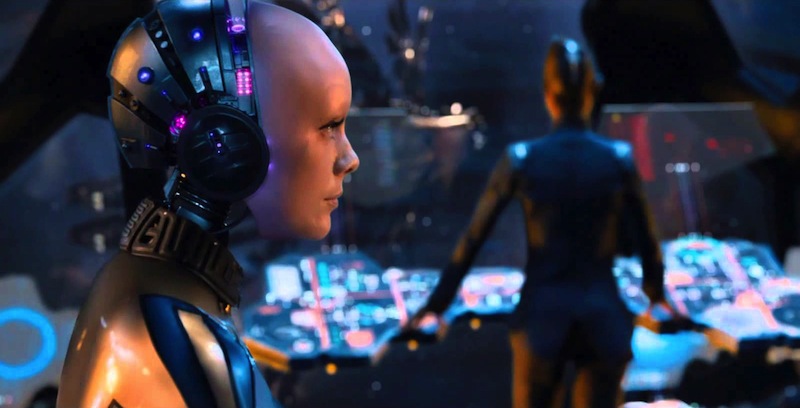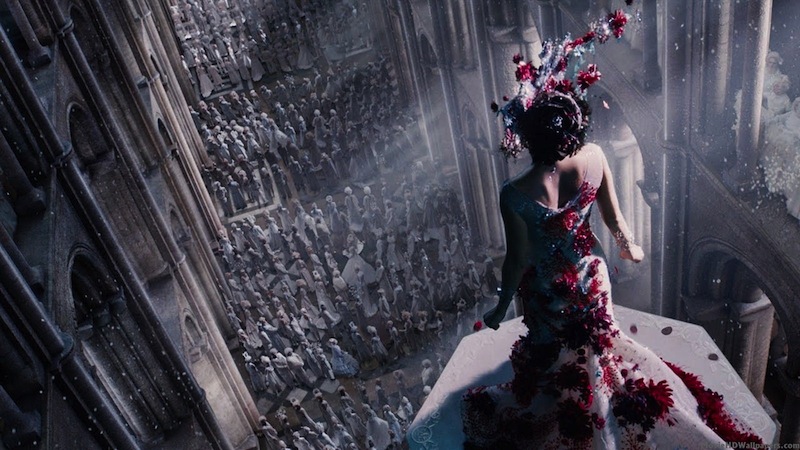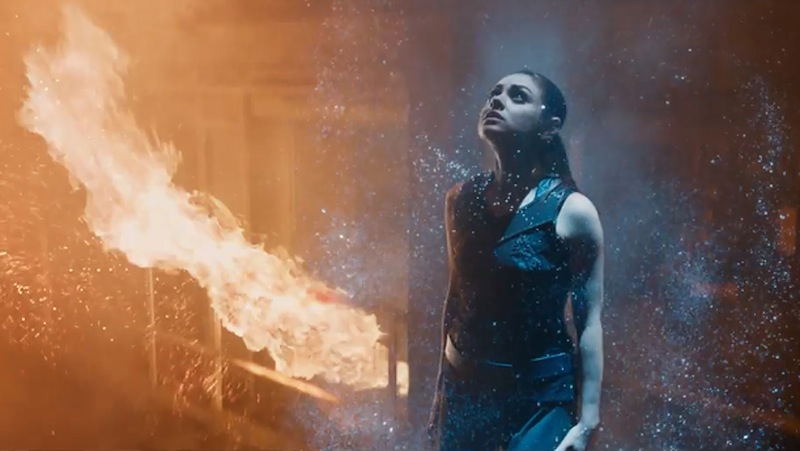I feel guilty talking trash about the Wachowskis’ new film Jupiter Ascending. It feels like mocking a family member or old friend who has fallen on hard times. The sibling duo of Lana and Andy Wachowski have produced precisely one classic science fiction epic—1999’s The Matrix—which is something most people don’t even dream of doing.
Now they’re back and the reviews of their latest—Jupiter Ascending—are mostly awful. And yet, should we feel guilty about disliking it? If we don’t like Jupiter Ascending, we may be in of danger hating on the idea “original” science fiction films and making said kinds of movies extinct. But is this supposedly original movie original at all?
The kneejerk complaint and/or defense of Jupiter Ascending emerging lately is that nobody likes the movie/it’s failing at the box office because it is a stand-alone original film and not part of a larger franchise series. Or put more reductively: audiences who like outer space movies only like tent-pole corporate blockbusters! This argument is most evident in a recent Variety article which claims that failure of Jupiter Ascending is bad for the future of hypothetical “original” movies. Recently in the Los Angeles Times, Lana Wachowski defended the originality of Jupiter Ascending by saying “When I was young, originality was everything. A sequel was like a bad word.” On paper, I’d like to agree with her and the Variety article. And, generally speaking, I love defending original works of science fiction simply on the grounds that they are original. (See: my controversial defense of Interstellar.) But Jupiter Ascending is a bad movie and certainly doesn’t feel remotely original at any point.
Mila Kunis’s titular Jupiter tells the audience in the first moments of Jupiter Ascending that she is technically, an alien. And, technically, Jupiter Ascending is an original script, but almost nothing about it feels that way, because there’s almost nothing in the narrative to care about at all. Mila Kunis as Jupiter Jones finds out she’s a space queen set to inherent rulership of the whole universe and reacts emotionally as though she’s swiping left on Tinder. While being pursued by spacey bounty hunters who look like Skeletor’s out-of-work-henchmen from Masters of the Universe, she is rescued by a pointy-eared Channing Tatum playing a character boringly named “Caine.” Originally sent to apprehend Jupiter, Caine changes his mind and/or heart because of events which are both never depicted and not explained at all.

Through various generic chase sequences that would both make Michael Bay blush and piss him off, the big “idea” of Jupiter Ascending turns out to be this: an entire planetary harvesting system exists just so people can develop the ultimate near-immortality elixir, which if you bathe in it, becomes the best body wash product ever. This substance, called “Abrasax,” is revealed in terribly predictable as being “made of people.” Yep. The line is almost identical to the similar (spoiler alert!) reveal in the sci-fi classic Soylent Green, where Charlton Heston weeps that Soylent Green is people, too. This is also like The Matrix, where it’s revealed to us that everything we think we know is something else and really just a pointless bi-product of that. In The Matrix our bodies were batteries for weird aliens. In Jupiter Ascending, entire planets are, in essence, just bars of soap waiting to be packaged. The revelation that an entire space empire is built on people wanting to get rid of their wrinkles is both hackneyed and unconvincing and makes the conspiratorial “twist” of Jupiter Ascending a cynical knock-off of both The Matrix and Soylent Green.
Obviously there’s nothing wrong with borrowing and re-doing concepts from The Matrix and/or Soylent Green (with a dash of Dune), but that requires you to actually homage all this stuff well. Yet in terms of the plot structure, dialogue, and acts of physical danger, Jupiter Ascending actually feels less-original than the extremely derivative and homage-heavy Guardians of the Galaxy. You could start watching Jupiter Ascending at literally any moment and feel like you were watching another movie. If it were re-titled Space Movie: The Movie, it would seem more original than the hacky title it does have which somehow references both Mila Kunis’ character and the fact that Eddie Redmayne lives in an improbable city inside of the planet Jupiter. Is it creative and original to have your title reference such things?

Let’s keep hitting the originality survey: The Silence from Doctor Who are subtly ripped-off, as are the designs of all the ships from John Carter. Every chase sequences/fight sequence is by-the-numbers and wildly less-original than any fight from The Matrix. The characters in Jupiter Ascending are beyond hollow and unrealistic to the point that one scene actually features a giant crowd at a wedding populated by robots “sims” as if to acknowledge that even the faces in the crowd are fake, pointless characters. Sean Bean has a daughter but nobody knows why and she barely figures into the plot. A winged-dinosaur henchperson is told that if he fails to capture Jupiter Jones, he’ll be punished. When he fails, we’re supposed to believe this dinosaur put himself into this flimsily torture machine willingly while another identical dinosaur takes his place. Does it matter that these winged dinosaurs have names? No. It does not.
Meanwhile, we’re told that Tatum’s Caine was once a winged-person who got his wings taken from him for the afore-mentioned thing he did that makes no sense. Now, a winged creature getting its wings back is a great premise, and it could have been exciting in Jupiter Ascending. But, because we never saw Channing Tatum’s character lose his wings, when he suddenly has them again in the last scene of the movie it feels hollow, stupid and unoriginal, because it looks like Barabrella. Contrast this with last summer’s Malificent, in which the return of Angelina Jolie’s wings is an amazingly triumphant moment because we saw the pain and betrayal that occurred when she lost them in the first place. Malificent may have been a remake to an adaptation of a Disney-reboot of a classic fairytale, but it knew how to tell a story about losing your wings and getting them back way better than Jupiter Ascending. If Jupiter Ascending is “original” and Malificent is commercial garbage, I’ll take the garbage, thanks. The writer of the Variety article wonders how the next generation of filmmakers will be inspired without “original” movies. Well, they won’t be inspired by bad ones that misuse awesome themes, that’s for sure.
Ironically or not, The Matrix sequels share a problem with Jupiter Ascending: rabbit hole fatigue. Since the “real” world of The Matrix is not near as interesting as the Matrix itself, the sequels are more boring than the original because the shock of the reveal wears off. (I can only remind everyone of that rave party dance number in The Matrix: Reloaded so many times. It’s like the movie was so bored with itself that everyone had to dance.) And it’s worse in Jupiter Ascending, because nothing is interesting about the larger universe Jupiter Jones encounters, owing to the fact that seems like a mishmash of everything you’ve ever seen before. True, what we think of as being “original” is almost always a derivation of something else (Star Wars, all Superheroes) but it’s the spin that matters. The script may have been “new” here, but the themes are endlessly tiresome and carried out by a set of characters we’ve already forgotten.

I believe the Wachowskis are still capable of great things. Their upcoming TV show Sense8 might be absolutely brilliant. Perhaps there’s heaps of material which was cut out of Jupiter Ascending by studio meddling which effectively gutted it of any real human connection. But I doubt it. I think the movie was a noble attempt to create something new while referencing lots of the familiar. And it was a complete failure. It was a bad film because it was a bad film. Perhaps the lesson we should take from Jupiter Ascending is that “originality”—perceived or genuine—has nothing to do with quality, or even watchability.
Ryan Britt is the author of Luke Skywalker Can’t Read and Other Geeky Truths (Plume Books) forthcoming this November. He is a longtime contributor to Tor.com.










